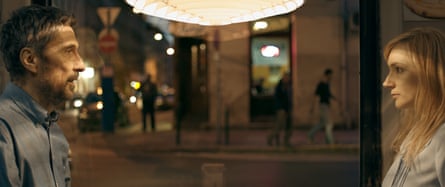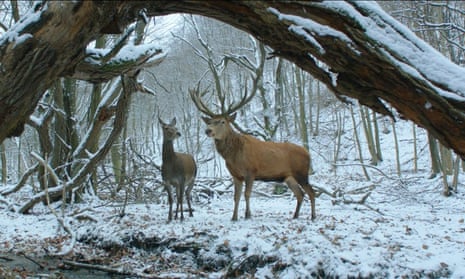On Body and Soul is an urban pastoral. It’s a love story that unfolds both in a secret inner dreamscape and an outer world of ostensible normality – which is actually far more comically irrational. This duality could be the one hinted at in the title. But which is body and which soul? Where do we assume the spirituality and physicality are located? It’s not entirely clear.
The Hungarian film-maker Ildikó Enyedi won the Golden Bear in Berlin this year for this film, perhaps her most notable success since winning the Camera d’Or at Cannes in 1989 for My Twentieth Century, about identical twin sisters heading for an appointment with destiny and modernity aboard the Orient Express. This movie has the same playfully unexpected sensuality that My Twentieth Century was praised for. Its eroticism has something of the Czech author Milan Kundera.

The premise of the film and its unwatchably brutal opening sequences are there to stun you, or in the butcher’s sense tenderise you, so that you hardly notice the implausible weirdness of human behaviour in the workplace scenes that follow. The setting is a slaughterhouse, and we see some explicit shots of animals being chopped up, and part of what we must absorb is the everyday paradox of commercial violence, which is extreme and yet entirely routine. It happens behind the backs of carnivore city-dwellers who might prefer not to know where their food comes from.
Endre (Géza Morcsányi) is the manager, a middle-aged man with a disabled arm and a drolly observant manner. His only friend, so far as this prickly and solitary man has friends, is HR supervisor Jenö (Zoltán Schneider), a beefy and hassled guy, forever being chivvied by his co-worker wife Zsuzsa (Zsuzsa Járó) with whom Endre once had a brief relationship. Endre’s eye is caught by a new person in the office: the delicately beautiful and shy young woman, Maria (Alexandra Borbély) who is the new hygiene inspector, examining the slaughtered beasts for signs of disease or excess fat. She radiates anxiety and loneliness and some Asperger mannerisms. Slowly and surely, Endre and Maria begin to fall in love. But they do this in the alternative universe of their dreams: they have the same, shared nightly dream, that they are deer wandering a snowy forest. We see this dream, and it is quite as real as anything else.
And how do they both find out? Ildikó contrives a comically preposterous plot mechanism whereby someone in the slaughterhouse has been stealing a special Viagra powder for cattle – the sheer improbability of an abattoir having such a thing needs its own sub-explanation – so each employee must naturally be interrogated by a distractingly sexy police psychologist Klára (Réka Tenki), questioning them about their dreams. A ridiculous and unlikely idea, yet such is the engaging nimbleness and poise of Ildikó’s direction that its surreal absurdity is noticed at first only as a comic lubricant for the poignant love story that is to come. Laura Marling’s bittersweet What He Wrote crops up pleasingly on the soundtrack.
The disconnect between mysterious dreamy visions of deer and gruesome scenes of cattle slaughter creates a space that the film utilises. Georges Franju’s famous short film Le Sang Des Bêtes (1949) proposed the grim reality of butchery as a hidden spectacle, lying behind the growing postwar urban world. Nikolaus Geyrhalter’s documentary Our Daily Bread (2005) showed it as part of something eerie, ruthless, uncanny, amoral: the inexorable process of food production.
Ildikó’s slaughterhouse scenes are different. They exist in tandem with those captivatingly romantic dream moments and the elegance and nobility of the deer. These imagined beasts are in a way the “soul” of the film and the hacked-to-pieces cows the all too obviously carnal “body”. And yet the blank horror of agribusiness dismemberment paradoxically refocuses the mind. If we think this spectacle is horrible or obscene, is it because, in our nausea, we are intensely aware of something other than body – something that has been degraded?
Certainly, Endre and Maria’s affair is at its most romantic when it is at its most eccentric and weird. They phone each other up when they are about to go to bed, and agree to tell each other the next day about the shared “deer” dream they are about to have. They even try sleeping in the same room, the same bed. The world of regular sex, to which they seem to be heading, is going to seem very banal by comparison.

Comments (…)
Sign in or create your Guardian account to join the discussion